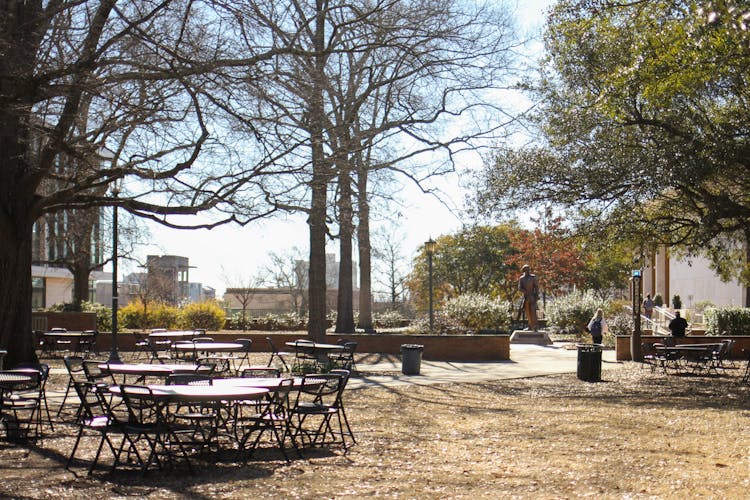With the warmer weather ahead, students should begin to study outside more. Students' study habits have a significant effect on their mental health and cognition, so taking advantage of studying outside can improve the mental well-being of students.
“Studying in my room — it just really didn't seem right, and then I just always fell asleep and I didn't get anything done,” Gabriella Robertson, a first-year nursing student, said. “I switched to outdoors and thought maybe it could help, and it honestly did. Just getting sunlight every day — it’s just it helps you a lot.”

Utilizing outdoor spaces on campus and getting away from studying in a small dorm room is impactful on the mental health and routine study habits of students.
“Outside it’s pretty spacious. You don't feel cooped up,” Tieu Thien, a first-year pharmacy student, said.
Cognition and other important aspects of studying, such as stress levels and focus, could also be improved by studying outdoors. A 2020 report from The American Psychology Association found that being exposed to nature is linked to lower stress, improved attention, better mood and cooperation.
Being outside can help students stay attentive to their work while also gaining the health benefits of outside time, such as fresh air and vitamin D from natural sunlight.
“Our body absorbs vitamin D from the sun — that's the best source of it — which some research suggests that is helpful to mitigate depressive symptoms, specifically things like fatigue and energy levels,” Jennifer Cross, the coordinator of counselor training at USC Counseling and Psychiatry within Student Health Services, said. “Fortunately on campus, we’ve got a ton of green spaces, you know, with the Horseshoe alone, which allows students to be outside and to take their materials out there.”
A 2019 study, published by The European Centre for Environment and Human Health at the University of Exeter, provides a closer look into how studying outside affects mental health. The study found that people who spend a few hours a week in outdoor spaces are more likely to report good health and psychological well-being than those who stay indoors.
The study mentions how being in nature generally has large effects on mental, emotional and physical health, and if more students can expose themselves to nature while they study, it makes a great impact on their well-being. Studying outside is also a great way for students to enjoy the USC campus.
“I love being outside, that's part of the reason I chose South Carolina was for the weather,” Benjamin Christianson, a first-year business management student, said.
There are many historic, spacious and quiet outdoor spaces around campus to study. The Horseshoe, one of the most historic spaces on campus, offers more space and silence compared to the busier spaces outside of the humanities building and Colloquium Café.
The fountain in front of Thomas Cooper Library and the neighboring Davis Field offer a great atmosphere, complete with shade and space to sit and study.
“Some people really like being in busy places where there's a lot going on,” Cross said.
Everyone studies differently. Some may prefer to have noise or people around in their study environment, but others may not. A 2010 article from Scientific American showed that noise has an effect on general stress levels, concentration and stress-related conditions, including high blood pressure.
With the help of fresh air, vitamin D and a quieter environment, students can improve their mental and physical well-being while changing their study habits for the better.




